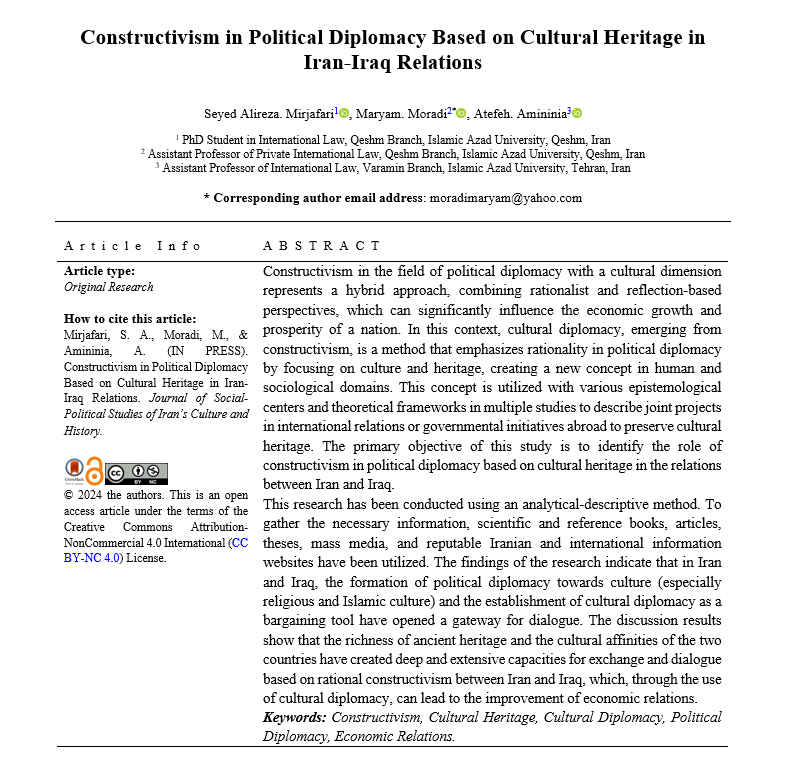تکوینگرایی در دیپلماسی سیاسی بر پایه میراث فرهنگی در مناسبات ایران و عراق
کلمات کلیدی:
تکوینگرایی, میراث فرهنگی, دیپلماسی فرهنگی, دیپلماسی سیاسی, مناسبات اقتصادیچکیده
تکوینگرایی در حوزه دیپلماسی سیاسی با سویه فرهنگی، شکلی امتزاجی از دو نگاه عقل گرایانه و انعکاس محور است که میتواند تاثیرات به سزایی در رشد و رونق اقتصادی کشور داشته باشد. در این فرایند، دیپلماسی فرهنگیِ زاییده تکوین گرایی روشی است که ابتنای نوعی خردمحوری در دیپلماسی سیاسی با تمرکز بر فرهنگ و میراث است که مفهوم جدیدی در حوزههای انسانی و جامعه شناختی ایجاد میکند. این مفهوم با کانونهای معرفتشناختی و چارچوبهای نظری مختلف در پژوهشهای متعدد برای توصیف پروژههای مشترک، در روابط بینالمللی یا ابتکارات دولتی در خارج از کشور جهت حفظ میراث فرهنگی استفاده میشود. هدف اصلی این پژوهش شناسایی نقش تکوینگرایی در دیپلماسی سیاسی بر پایه میراث فرهنگی در مناسبات بین دو کشور ایران و عراق است. این پژوهش با روشی تحلیلی- توصیفی انجام شده است. برای گرد آوری اطلاعات مورد نیاز این تحقیق، از كتابهای علمی و مرجع، مقالات و پایان نامه ها، رسانههای ارتباط جمعی و سایتهای اطلاعاتی ایرانی و خارجی معتبر استفاده شده است. یافتههای پژوهش بیانگر این واقعیت است که در ایران و عراق، تکوین دیپلماسی سیاسی به سمت فرهنگ (به ویژه فرهنگ دینی و اسلامی) و تشکیل و ایجاد دیپلماسی فرهنگی به عنوان یک ابزار چانهزنی فتح بابی جهت گفتگو باز نموده است. نتایج بحث نشان میدهد غنای میراث باستانی و تعلقات فرهنگی دو کشور، ظرفیتهای ژرف و گستردهای جهت تبادلات و گفتمان سازی بر پایه تکوین گرایی خرد محور بین دو کشور ایران و عراق برقرار کرده است که میتواند با بهره گیری از دیپلماسی فرهنگی به بهبود مناسبات اقتصادی بینجامد.
دانلودها
مراجع
Ahmadi, H. (2003). Iranian National Identity: Foundations, Challenges, and Requirements. Cultural Research Letter, 7(6).
Ashena, H., & Rouhani, M. (2010). Cultural Identity of Iranians: From Theoretical Approaches to Fundamental Components. Cultural Research Quarterly, 3(4).
Black, J. (2010). A History of Diplomacy. Reaktion.
Dinstein, Y. (2009). The International Law of Belligerent Occupation. Cambridge University Press.
Douglast, J. (2003). Experts Please to Pentagon Didn't Save Museum. N.Y Times.
Fahimi Fard, M., Saeedi Jowhadi, H., & Bahadori, M. (2021). The Role of Economic Diplomacy in Developing Economic Cooperation between Iran and Central Asian Countries (Case Study: Khorasan Razavi Province). International Political Economy Studies, 4(2), 769-798.
Fuller, J. (2003). Thief of Iraq's Art Treasure Continuing, Cultural Heritage International. SunTimes.
Ghahremanpour, R. (2004). Constructivism: From International Politics to Foreign Policy. Strategic Studies Quarterly, 7(24), 299-318.
Ghasemi, H. (2009). Iranian Culture and Globalization: Opportunities and Challenges. Proceedings of the First International Conference on Iranian and Global Developments, Tehran.
Javadi Arjmand, M. J., Naderi, M., & Davoudi, M. (2012). Iran's Cultural Diplomacy in Iraq and Future Prospects of Bilateral Relations. New Perspectives in Human Geography, 4(3).
Karami, J. (2004). Foreign Policy from the Perspective of Social Evolutionism. Strategy Magazine, 31.
Lähdesmäki, T., & Čeginskas, V. L. (2022). Conceptualisation of Heritage Diplomacy in Scholarship. International Journal of Heritage Studies, 28(5), 635-650. https://doi.org/10.1080/13527258.2022.2054846
Miri Nam Niha, M., & Omidi, A. (2022). Analysis of UNESCO's Cultural Policy and Its Role in Connecting the Iranian Cultural Civilization Sphere. International Studies Quarterly, 19(1).
Mokhles, S., Nejati Hosseini, M., & Ahmadi, O. A. (2023). Herbert Marcuse's Theory of Culture and Rationality. International Political Economy Studies, 6(1), 165-191.
Nargesi, S., Babaki, R., & Efti, M. (2020). Examining the Relationship between Tourism, Economic Growth, and Financial Development in Iran (1989-2016). Financial Economics Quarterly, 12(44).
Pakayin, M. (July 23, 2008). Iran and Iraq on the Path of Cultural Relations Development. https://jamejamonline.ir/fa/news/189964
Petraeus, G. D. H. (2007). Commander, Multi-National Force-Iraq Joint Hearing of the U.S. House of Representatives Committee on Foreign Affairs and the Committee on Armed Services.
Pourali, P. (2021). Approaches to Iran's Cultural Diplomacy in Iraq after the Fall of Saddam. Political Studies of the Islamic World, 11(1).
Shaika, K. D. (2003). Iraq Museum Reopens with Assyrian Treasure. N.Y Times.
Trötschel-Daniels, B. (2022). Cultural Diplomacy and Cultural Heritage: Envisioned, Refused, Denied, Accomplished (1889-1969). In Culture as Soft Power. De Gruyter. https://doi.org/10.1515/9783110744552-013

دانلود
چاپ شده
ارسال
بازنگری
پذیرش
شماره
نوع مقاله
مجوز
حق نشر 2025 Seyed alireza Mirjafari (Author); Maryam Moradi (Corresponding Author); Atefeh Amininia (Translator)

این پروژه تحت مجوز بین المللی Creative Commons Attribution-NonCommercial 4.0 می باشد.







